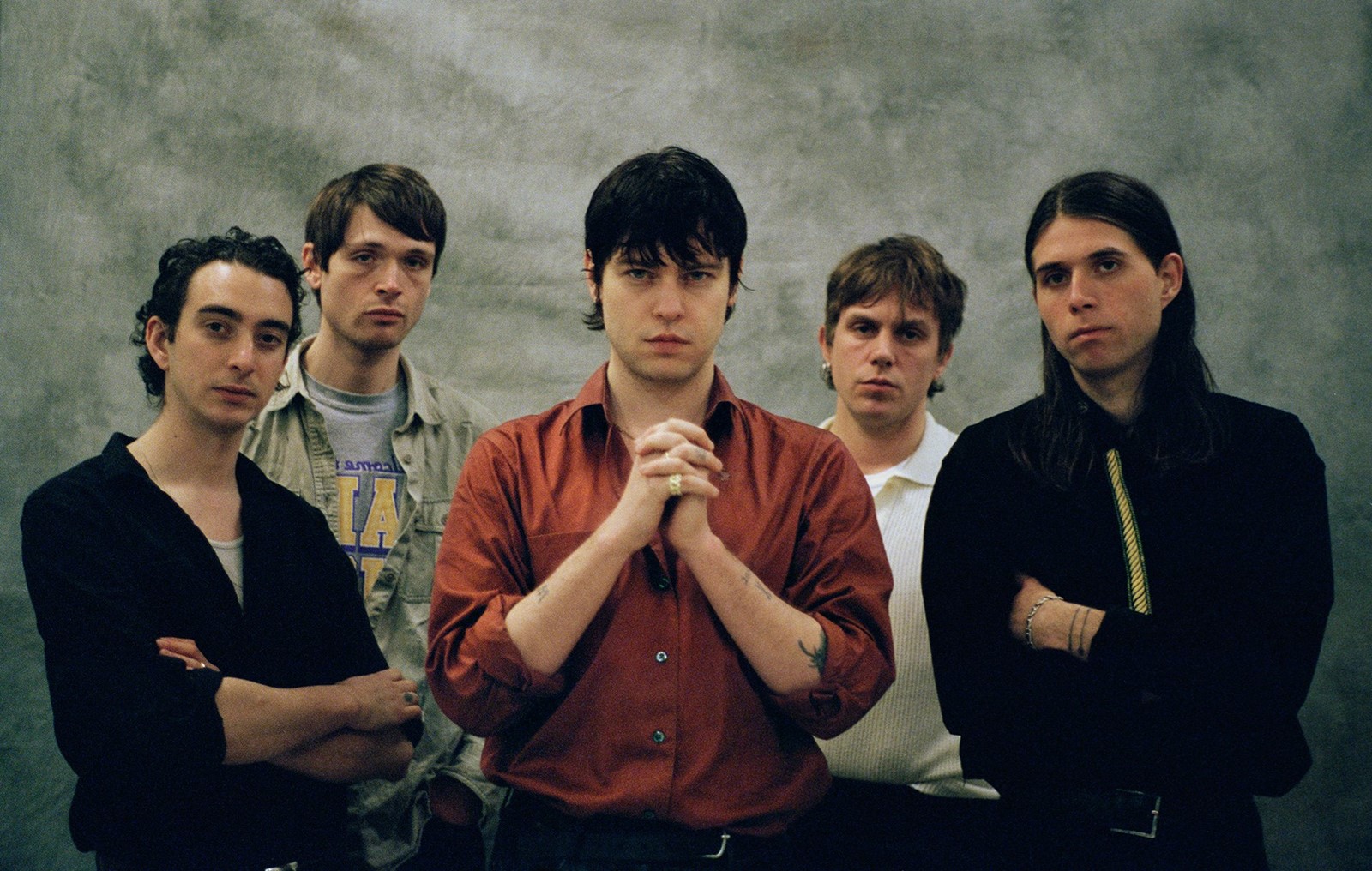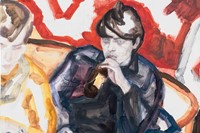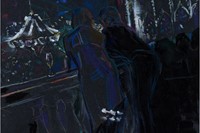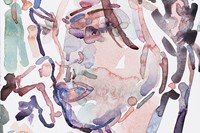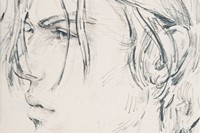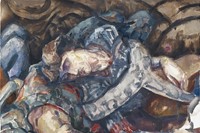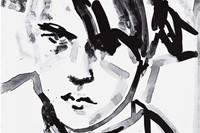“I’m sort of getting used to being statically in one place for the first time since I was a teenager,” Iceage’s Elias Bender Rønnenfelt shares over Zoom from his home in Copenhagen, where he’s been (behaving himself) for the past year. “You do find, first of all, you can create lots of mess in the city you’re from, you don’t have to run away to do that. And second of all you just find that the ideas start coming from different places, or there’s just another tempo to things.”
Iceage’s recent video, Shelter Song, directed by the band’s close friend Catherine Pattinama Coleman, pays tribute to their circle in a place they’ve known most unconditionally.
“Because Catherine knows us so well and we come from the same tight-knit group since forever, she’d be the only one that we would trust in making a personal video such as this,” explains Rønnenfelt. “She could do it without being invasive or it being forced. We basically just rolled out to friends that they could show up on the day and there would be drinks and food: old friends and no casting involved.”
Growth is one of life’s inevitabilities: the video is a reminder of that. But any journey – be it artistic or personal – isn’t by nature comfortable. Which makes this band, who are all under 30, something of an outlier as they unveil their fifth album, Seek Shelter: each time they strive closer to a new prowess. Going against the grain suits them well, having arrived as teen punks loaded with outsider spirit. Forget the manicured moment, and think of their catalogue as living and breathing. Iceage aren’t afraid to depict such a construct.
“That’s kind of where it comes from,” picks up Rønnenfelt. “This is what I’ve chosen as my life’s pursuit, and it’s a lovely surprise that I still find it to be the thing I care about the most. Some people have to search long for any kind of meaning and purpose and I basically just stumbled into it like some kind of lucky bastard, you know? I don’t like the notion of having arrived, I’ve gotten wiser behind my years, you know, and you do get experience, but further down the road just brings, like, a whole new set of problems. It sounds so smug saying that you’ve learnt anything: I’m an idiot, you know.”
Seek Shelter is their first release on the Mexican Summer label. It’s the only LP they’ve made with a pair of hands other than longtime collaborator Nis Bysted’s, recorded with Sonic Boom (Pete Kember of Spacemen 3) at Namouche, a run-down wood-panelled vintage studio in Lisbon. It was Kember that put out an interest in working with the band.
“It was good; it was joyous at times, it was maddening, it was easy, it was difficult, it was a lot of things,” Rønnenfelt continues, subtly tracing the philosophy that everything, indeed, happens all at once. “Letting in an outsider just seems like a wild risk, you know, which I guess this was: the sacred thing, and all that you bled for, these words or these melodies, you only have one shot at giving it justice. But [Kember] just came right onboard and flowed with us very well; we had the same twisted sense of humour, gravely, we were laughing a lot. He was very present: he came in with ideas when he should, stepped back when he should and provided clarity when we were banging our heads against the wall.”
Atmosphere weighing heavier than functionality, water leaked throughout the session into buckets, swathed in cloth as to avoid the microphones. A song on the album, Drink Rain, is the sweetest Iceage have ever been, short of white doves and soft focus. As sweet as licking puddles can be, anyway.
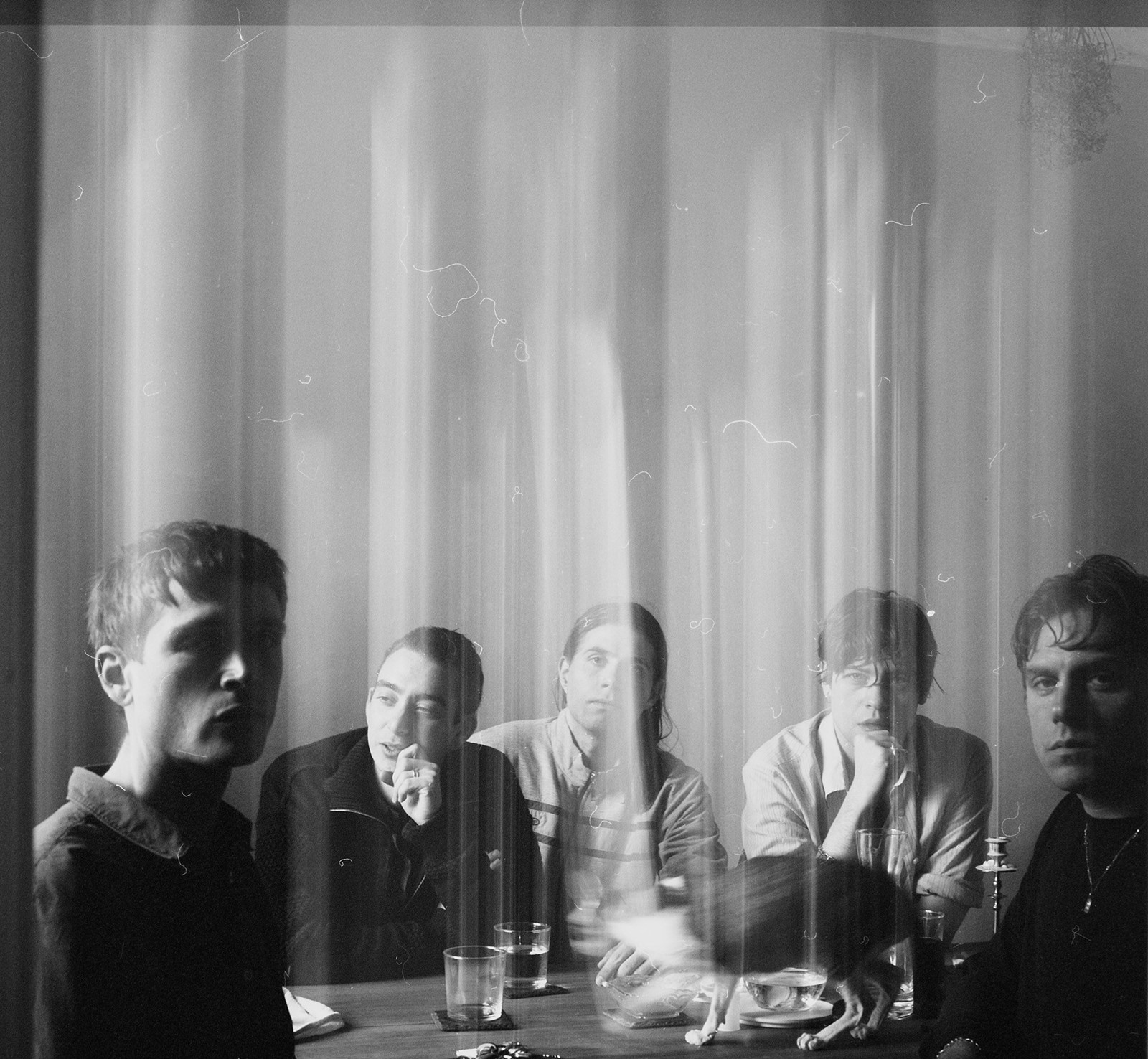
“Those words were written before I knew it would be literally raining on me recording that song,” jabs Elias. “It was strangely prophetic.”
The abrasion of Elias’ vocals, which forever sound like they’re being sung at the end of a night, as daylight steals one’s last savoured moments, is contrasted with a new richness on Shelter Song and Love Kills Slowly, thanks to The Lisboa Gospel Collective. If working with a gospel choir was intimidating for the band, the singers likely turned up feeling the same, a world away from what Rønnenfelt does. “But they completely got the music and started harmonising with each other. It was a really uplifting, joyous thing.”
The band – which comprises of Rønnenfelt (vox/lyrics), Johan Surrballe Wieth (guitar), Jakob Tvilling Pless (bass) and drummer Dan Kjær Nielsen – have also added an extra guitarist, Casper Morilla Fernandez, to their line-up.
As High & Hurt interpolates Will The Circle Be Unbroken, ‘a warhorse of the American religious vernacular that has become an increasingly urgent plea over the past century’, Rønnenfelt, who is prolific across a number of musical projects including Marching Church, Pagan Youth and Vår (War), reaches out to the patron saint of music and poetry on Dear Saint Cecilia, ‘a song for seekers everywhere’. Last year, he composed an instrumental piece for the Busan Biennale inspired by KIM Soom’s Green is for Sorrow, a novel written after talking to ‘comfort women’ for Japanese soldiers during the Second World War in South Korea. “A gorgeous, beautiful, very sad story,” Rønnenfelt says.
Like Dorian Gray, this most literary frontman has portrait of him somewhere: several, in fact, having been painted by Elizabeth Peyton (a portfolio of which was seen in the Spring/Summer 2017 issue of Another Man). Rønnenfelt featured in her 2019 show Aire and Angels at the National Portrait Gallery, a display which saw the American artist juxtapose a 1575 portrait of Elizabeth I, from the museum’s own collection, with her canvas of Kurt Cobain. “Through sitting [for Peyton] a conversation sprung,” he shares, “and a friendship that’s lasted many years now.”
“I’m terrified of nostalgia,” Rønnenfelt considers. “I don’t want it to become a shackle around my ankle. I will try and just throw myself into the arms of life. Often writing is a way of making sense of it all. Part of why it’s nice to put music out is that you let go of some sort of control: music just gets to live out there.”
Seek Shelter is out now on Mexican Summer.
